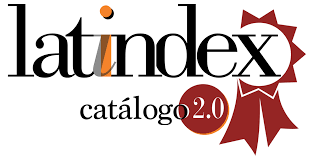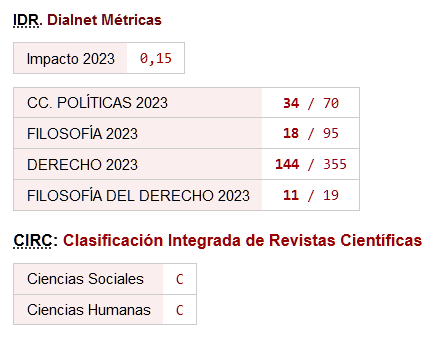About the Journal
Journal background
International Journal of Political Thought (RIPP) is an annual publication focusing on Political Philosophy and Philosophy of Law, produced by the Laboratory of Political Ideas and Practices (LIPPO). It is mostly composed of peer-reviewed original articles, as well as bibliographical reviews, testimonials and other content.
RIPP is the result of an agreement between the University of Huelva and the Fundación III Milenio. It was later incorporated into LIPPO, the Pablo de Olavide University's own research centre.
Approach and scope
The International Journal of Political Thought is an annual scientific journal. The aim of the journal is to disseminate research work in the field of political thought, which, due to its originality and scientific rigour, deserves to be published in a scientific journal. It encourages specialisation, interdisciplinarity, creation and criticism, and the serious debate of ideas. The journal publishes quality articles that offer both monographic research results and panoramic views of the progress of studies in political thought, debate articles and commentaries on important publications. In particular, it aims to:
- To provide society and the university community with a high quality scientific journal in the field of political philosophy, which publishes research work carried out by national and foreign academics and researchers. The subjects of the journal are Philosophy of Law, Political Philosophy and Political Science. The journal is aimed at specialists in these subjects and the general public interested in them, who are usually present in public opinion and the media.
- To serve as a vehicle for the exchange of ideas and research results.
- To provide a space for Research Groups to publish research results related to political thought.
- To carry out a critical and rigorous reflection on current social problems.
- A special interest in collaborations with Latin American authors and academic relations between Spain and Latin America.
Frequency of publication
The journal is published annually. It has a paper version and a digital version. The articles in the digital version are freely accessible from the moment of publication to anyone, who may print them or transfer them freely with the sole limitation that they may not be used for commercial gain. The edition closes in November and the corresponding issue is published in January and March. Papers are accepted in English, French, Portuguese and Italian, in accordance with the criteria established by the Editorial and Programming Committee.
Peer review and anti-plagiarism check process
Articles will be submitted to two external reviewers (double-blind system). The reviewers will be appointed by the journal's committee, with those who are affected by academic or kinship relationships with certain authors abstaining from the debate and appointment in the interests of greater impartiality and objectivity.
Likewise, the journal takes into consideration the automatic evaluation of the possibility of plagiarism that is carried out by means of various tools. The editorial team will make a decision regarding these reports and will inform the authors of the final decision.
Structure and methodology
The journal consists of the following sections:
- Two monographs on hot topics of current affairs and controversy (which may include a part of opinion articles and a part of documents).
- Various studies (always relevant to the subject matter: political philosophy, legal philosophy and political science).
- Interview with one of the great masters of political philosophy.
- In memoriam or Semblanza, to gloss the work of a great thinker who has recently passed away.
- The Ripp Debate, on an extraordinary political event or a highly topical and original subject.
- Spanish political thought.
- Testimony, to highlight the experiences of the actors and the practical dimension of politics.
- Unpublished works of a great thinker or political activist.
- Bibliographical notes.
- Brief curriculum vitae of the co-authors.
The monographs will be preceded by the presentation of their caretakers and coordinators.
'Open access' policy
Free and open access to all the contents of the issues of the journal is allowed to any interested party, free of charge, and all articles may be printed and transferred, with the sole condition that the source and authorship must be specified.
The journal: a) does not charge authors any article processing or submission fees, b) maintains copyright for authors without restrictions, c) enables authors to retain their publication rights without limitations.
The International Journal of Political Thought releases content under the Creative Commons Attribution-NonCommercial-NoDerivativeWorks 4.0 CC BY-NC-ND licence available at the following url: https://creativecommons.org/licenses/by-nc-nd/4.0/legalcode
The International Journal of Political Thought is an original work of the Laboratory of Political Ideas and Practices of the Pablo de Olavide University. All articles included in the Journal are the original work of their respective authors. This Journal is freely offered to the scientific and academic community at no cost and operates under a Creative Commons Attribution-NonCommercial-NoDerivatives 4.0 International License.
You can access all issues of the Journal and its contents through the links available on this website. You may freely share and disseminate this content, as well as use it for any work, thesis or article, as long as you make express reference to its original author, to the issue of the Journal in which it appears and to the Laboratory of Political Ideas and Practices. If you would like to translate or compile any of the articles available here, please get in touch.
You may not appropriate this content, modify it or use it for commercial or for-profit purposes. No transformation of the content available on this page or in the Journal itself is permitted.
For more information, you can consult the licence agreement at: https://creativecommons.org/licenses/by-nc-nd/4.0/legalcode
Inclusive language policy
Authors should use unbiased gender language and try to avoid expression that discriminates against groups of people on the basis of gender (as well as socio-economic status or racialisation). In particular, they are expected to avoid promoting, reinforcing or exploiting questionable, unfair or irrelevant distinctions between or attitudes about sexes/genders. They are also expected to avoid using language that demeans, ignores or stereotypes any sex/gender.
The CSIC guide for the Spanish language is available at https://intracom.es/index.php/intracomjournal/politica-de-genero










 ISSN: 1885-589X
ISSN: 1885-589X  Universidad Pablo de Olavide
Universidad Pablo de Olavide